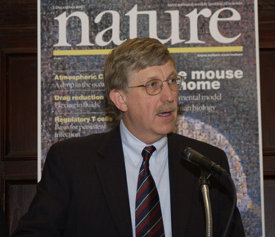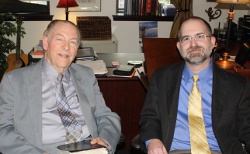"In reality, the Creation Museum is all about the authority of the Bible"
Body
Discussion
Fight over evolution still simmers 85 years after Scopes trial
Body
Discussion
Review - The Message of Creation
[amazon 0830824057 thumbnail] |
The Message of Creation by David Wilkinson is a light commentary with ample contemporary application on the biblical theme of creation. Wilkinson is a competent theologian with a scientific background, making him well qualified to speak on the theme of creation. His pastoral experience shows through as he provides lengthy applications from the many biblical passages he discusses throughout the book. In his defense of the idea of a Creator, he also interacts with well known atheists (past and present) such as Carl Sagan and Richard Dawkins.
The book considers five aspects of the doctrine of creation through 20 passages of Scripture. Wilkinson is quick to point out in the preface that the book is not a systematic theology on the doctrine of creation, though the theologian in him might prefer to write such a book.
It is a kind of journey. Some will want to get to the destination quickly, but that is not what we shall do. We have twenty “villages” to visit on the way in pursuing the doctrine of creation and opening up its biblical themes. Their large number of passages and their diversity is testimony to how important this doctrine is within the biblical literature. (p. 11)
Discussion
At Least You've Got Thumbs
Body
Discussion
"Our supposedly eminent Bible scholars are now going on record to say that we must subordinate the authority of Scripture to the higher and more objective standard of secular science."
Body
Discussion
Anti-creationist Wins Templeton (Ir)religion Prize
Body
Discussion
Dominion over the Animal Kingdom

How you relate to animals is a revealing indicator of your worldview—even of your character. By virtue of our nearly unlimited powers over animals, how we treat them is no trivial matter. It is a litmus test of mind and soul.
We may note, on one radical fringe, those who speak of animal rights as if animals were superior to humans. Such people vandalize biology labs that experiment on animals in the interest of humans, throw paint on fur coats, and burn homes built in forested areas. Less maliciously, but just as tellingly, are those who wave mosquitoes away rather than slap them dead, tiptoe around ants, practice catch-and-release methods with mice found in their homes, and view the ingestion of animal meat as complicity in murder.
On the other radical fringe are those who torture and abuse animals. We witness this on the small scale when someone is exposed by the media for cruelty to a pet. On a grander scale, cruelty to animals has become a way of life at some farm factories.
One of the serious social implications of the demise of the family farm has been the rise of a few corporations that produce meat in the most cost-efficient manner. Here, executives in air conditioned offices pour over spreadsheets, pressing for higher profit margins. Their policies force workers, for instance, to confine millions of hogs to live out their days in 22 inch wide metal stalls in which they cannot turn around, never see the light of day, will never set foot on earth, and, due to medical “advances,” can now be raised in conditions that by all rights should kill them. And this is to say nothing of the genetic engineering quest to produce (and even clone) such hideous creatures as featherless chickens and stress-free hogs (zombies) to increase profit margins by minimizing farming hassles. (See Matthew Scully’s book, [amazon 0312261470], St. Martin’s Press, 2002).
Discussion
Francis Collins - No Friend of Bible Believers
 Francis Collins, the former Director of the Human Genome Project (HGP) and now the Director of the National Institutes of Health (NIH), has risen to national prominence in recent years. His scientific acumen combined with his rather public confession of Christian faith has garnered both excitement by Christians, as seen in these Christianity Today articles (here and here), and interest among unbelievers, as in this exchange with Richard Dawkins in Time.
Francis Collins, the former Director of the Human Genome Project (HGP) and now the Director of the National Institutes of Health (NIH), has risen to national prominence in recent years. His scientific acumen combined with his rather public confession of Christian faith has garnered both excitement by Christians, as seen in these Christianity Today articles (here and here), and interest among unbelievers, as in this exchange with Richard Dawkins in Time.
But not everyone is excited about Collins’ recent appointment by President Obama to direct NIH. Sam Harris, the author of the atheistic diatribes against faith, The End of Faith and Letter to a Christian Nation, questions Collins’ fitness for NIH due to the geneticist’s Christian faith in this NY Times piece. While I don’t question Collins’ fitness for his present position, I do question how much he should be viewed as an ally of Bible-believing Christians. His foreword in a new book exposes his disdain for anyone who would take the creation account in Genesis 1-2 as an accurate description of the beginning of the world. Collins pens a four-page foreword for Karl Giberson’s Saving Darwin: How to Be a Christian and Believe in Evolution (Harper One, 2008). In this rather strained attempt to harmonize Christianity and Darwinism, Giberson stretches the limits of reason and logic in an attempt to reconcile the irreconcilable. His book is introduced by Collins’ similarly tortured attempt to elevate science way beyond its boundaries and to denigrate anyone who supports Intelligent Design (ID), young-earth creationism or virtually anything regarding the early chapters of Genesis.
Collins describes ID’s challenge to evolution’s ability to explain irreducibly complex structures in living organisms as pressing on “despite the lack of any meaningful support in the scientific community” (p. v). This statement is simply not true and masks not only the many scientists who question Darwinism’s explanation of irreducible complexity but also the almost universal pressure on scientists to toe the party line concerning Darwinism.
Discussion
An Interview with Dr. John C. Whitcomb
 On Saturday, November 21, I attended what is something of a rarity these days—a prophecy conference. Dr. John Whitcomb spoke from the book of Daniel, focusing on the prophetic visions of Nebuchadnezzar and Daniel himself. I was there because I wanted to interview Dr. Whitcomb and the conference location was just a few hours from where I live. So the event itself wasn’t the main draw.
On Saturday, November 21, I attended what is something of a rarity these days—a prophecy conference. Dr. John Whitcomb spoke from the book of Daniel, focusing on the prophetic visions of Nebuchadnezzar and Daniel himself. I was there because I wanted to interview Dr. Whitcomb and the conference location was just a few hours from where I live. So the event itself wasn’t the main draw.

Discussion